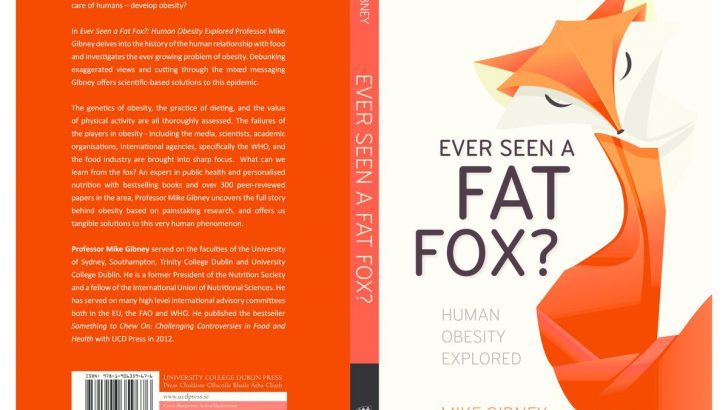Ever Seen a Fat Fox? Human Obesity Explored
by Mike Gibney
(UCD Press, €20.00)
Peter Hegarty
“A tsunami of lard” has been gathering strength since about 1990, writes Mike Gibney, chair of the Board of the Food Safety Authority of Ireland, in an informed, intelligent study of a modern epidemic.
People are putting on weight because they are expending less energy than they are consuming. Rates of obesity are rising, the author convincingly argues, because our lives, particularly our working lives, are increasingly sedentary.
In the pre-digital age office workers would routinely get up from their desks, go to the filing cabinet, take a document to the photocopier or fax machine, replace it, and then walk back. In doing so they were burning off calories. Today’s office-workers access and send information without moving from their desks. For many of them the car is the only way to get to a workplace many miles away from their homes.
Food industry
Blaming the food industry for our increasing girth is missing the point. Food, processed or not, does not ‘cause’ obesity. And in any case we have been processing our food since we lived in the caves. Early man discovered by chance that smoking meat improves its flavour. He learnt how to turn milk into cheese, or butter. But his changing diet didn’t make him obese, as his life was much more physically demanding – and shorter – than ours.
The author advocates exercise (he’s particularly keen on regular brisk walks). He advises us get into the habit of asking ourselves some simple questions as the next meal approaches: how hungry am I? Could I combine a smaller portion with more vegetables or salad? Or skip dessert?
He makes the connection between cheap, easily available alcohol and expanding waistlines: if you want to lose weight dri nk moderately, or not at all.
A macro-response to obesity could complement individual initiatives. Fiscal incentives could encourage the food industry to improve the nutritional quality of its products.
Since obesity can be inherited, it makes sense to screen infants for any genetic predisposition to it. An agency similar to the RSA could educate people about food and exercise.
Intake
In a powerful chapter Gibney calls for more understanding of the plight of the obese. Many of us wrongly assume that obese people can’t – or can’t be bothered to – control their intake of food. We may not realise that an obese person may be suffering from an inherited condition or conditions, or that he may in fact be making every effort to shed weight.
In this age of equality – Mike Gibney memorably contends – the obese are the last group which it is socially acceptable to deride.




